Arthur Machen and “The Great God Pan”
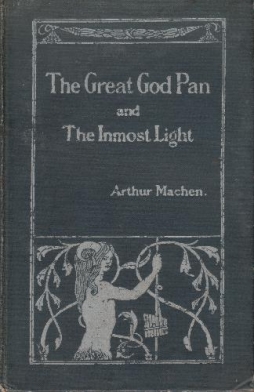 Arthur Machen first published a version of “The Great God Pan” in 1890, in a magazine called The Whirlwind; then revised and extended the tale for its republication as a book in 1894, when it was accompanied by a thematically-similar story called “The Inner Light.” It’s a fascinating work, creating a horrific mood mostly through suggestion and indirection. Nowadays, one looks at it and notes very Victorian attitudes toward women. At the time of its original publication, the story’s implied sexuality caused real scandal.
Arthur Machen first published a version of “The Great God Pan” in 1890, in a magazine called The Whirlwind; then revised and extended the tale for its republication as a book in 1894, when it was accompanied by a thematically-similar story called “The Inner Light.” It’s a fascinating work, creating a horrific mood mostly through suggestion and indirection. Nowadays, one looks at it and notes very Victorian attitudes toward women. At the time of its original publication, the story’s implied sexuality caused real scandal.
Machen was born in Wales in 1863 as Arthur Llwellyn Jones-Machen; the ‘Machen’ was his mother’s maiden name, which he later took for his pen name. His father was a clergyman, and while Machen’s lifelong interest in the occult and the weird seems to have been sparked by precocious reading of his father’s library, his family was too poor to send him to university. Following the publication of a long poem in 1881, Machen lived in London as a journalist and translator. He married in 1887, meeting occultist A.E. Waite through his wife. She died in 1897; in 1900 he joined Waite’s Order of the Golden Dawn. In 1901, he became an actor, and remarried in 1903. He continued to write, and in 1914 one of his short stories, “The Bowmen,” inspired the urban legend of the Angels of Mons. He died in 1947.
Machen’s literary reputation has seen several ups and downs, starting during his lifetime. The controversy surrounding “The Great God Pan” seems to have blackened his name, but there was a re-evaluation of his work in the 1920s. H.P. Lovecraft hailed him as a contemporary master of the supernatural in literature, and Lovecraft’s mythos was significantly influenced by Machen’s fiction, including “The Great God Pan.” Today, Machen is considered a major early fantasist, with “The Great God Pan” one of his masterworks. I want to look in some detail at the story, and consider some of what’s going on in it (that involves a complete plot summary; you can read the whole story online here first, or listen to a reading of it here.)
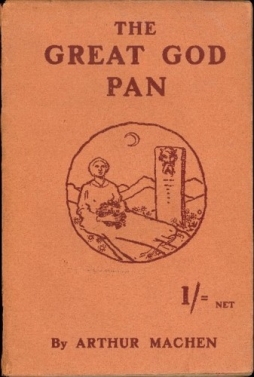 The tale opens in Wales, at the home of a scientist, Dr. Raymond, who’s explaining an upcoming experiment to his nervous friend, Clarke. Raymond’s a brain specialist, a student of “transcendental medicine,” who intends to operate on a seventeen-year-old girl named Mary; he’ll sever a part of her brain tissue so that she may “lift the veil” and see a more profound, spiritual world. There are risks, perhaps, but according to Raymond, “I rescued Mary from the gutter, and from almost certain starvation, when she was a child; I think her life is mine, to use as I see fit.” He performs the operation, and after a moment of apparently seeing some exalted vision and then absolute horror, Mary’s left with profound mental retardation.
The tale opens in Wales, at the home of a scientist, Dr. Raymond, who’s explaining an upcoming experiment to his nervous friend, Clarke. Raymond’s a brain specialist, a student of “transcendental medicine,” who intends to operate on a seventeen-year-old girl named Mary; he’ll sever a part of her brain tissue so that she may “lift the veil” and see a more profound, spiritual world. There are risks, perhaps, but according to Raymond, “I rescued Mary from the gutter, and from almost certain starvation, when she was a child; I think her life is mine, to use as I see fit.” He performs the operation, and after a moment of apparently seeing some exalted vision and then absolute horror, Mary’s left with profound mental retardation.
Several years later, Clarke is living in London, severely affected by Raymond’s experience; he shuns the supernatural and everything that is not commonplace — except for an attempt to compile a book of “Memoirs to Prove the Existence of the Devil,” which has led him to acquire accounts of the life of a girl named Helen V., a girl adopted in a village on the border of Wales. Over the course of some years, Helen was seen having odd dealings with strange little men from a nearby forest, later leading another girl to a strange encounter in the woods, then leaving the village mysteriously. The scene then shifts to a man named Villiers, who encounters an old friend named Charles Herbert, in some way ruined or driven half-mad by his wife, who has since abandoned him. Villiers investigates Herbert’s case, learning more about his peculiar wife, and discusses the matter with Clarke, who happens to be Villiers’ friend; Clarke recognises a picture of Herbert’s estranged wife as very nearly the image of Raymond’s Mary. In the next chapter, Villiers discusses the strange situation with his friend, Austin, and discovers that Mrs. Herbert was in some way involved in the mysterious death of a talented painter in South America.
The next chapter begins with an omniscient narrator recounting a curious wave of suicides among rich men in fashionable London society. Over the next chapters, Villiers and Austin come to realise that a society hostess named Mrs. Beaumont is responsible — and that Mrs. Beaumont, late of South America, is none other than the former Mrs. Herbert. Villiers proclaims to Austin that he intends to visit Mrs. Beaumont with a noose, and give her the choice between suicide and exposure. The conclusion of the story presents fragments of various texts: the first is the personal recollection of a doctor who examined a peculiar corpse — “I saw the form waver from sex to sex, dividing itself from itself, then again reunited. Then I saw the body descend to the beasts whence it ascended, and that which was on the heights go down to the depths, even the abyss of all being” — which is followed by excerpts from two letters. The first is from Clarke to Raymond, alluding to the final encounter with ‘Mrs. Beaumont,’ Helen, and describing his visit to Wales, where he saw a Roman ruin with an inscription to the god Nodens, “the god of the Great Deep or Abyss”. The second is from Raymond to Clarke, telling him that Mary was Helen’s mother, and strongly implying that the god Pan was her father.
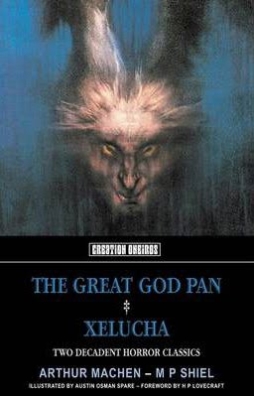 It’s a strange story, all told, and the bare plot description tends to emphasise the ramshackle nature of its plotting. The characters don’t really emerge as distinct personalities; occasionally we’re told some fact about one or another (Clarke’s turning-away from the supernatural, for example), but it rarely seems to affect their words or deeds. And they all seem to know each other, to the point that London seems like a small village. The final confrontation is left mysterious. Helen commits suicide for no obvious reason — what does she have to fear from ‘exposure’? And how does her death go unreported?
It’s a strange story, all told, and the bare plot description tends to emphasise the ramshackle nature of its plotting. The characters don’t really emerge as distinct personalities; occasionally we’re told some fact about one or another (Clarke’s turning-away from the supernatural, for example), but it rarely seems to affect their words or deeds. And they all seem to know each other, to the point that London seems like a small village. The final confrontation is left mysterious. Helen commits suicide for no obvious reason — what does she have to fear from ‘exposure’? And how does her death go unreported?
The construction of the tale is odd, too. There’s a kind of vacuum at the heart of it: Helen is never given any lines to speak, or clear motivation, or any sort of real personality. It’s a horror story without a clear horror at its heart. Only death, suicides and men ruined for no clear reason. Nor is there much real action directly depicted in the story; after the first section, it’s essentially a series of incidents recounted by one (male) character to another (male) character. How is it that it hangs together?
For hold together it does. Odd as it may seem, it’s also effective. I think the first reason for this is the matter-of-factness of much of its prose. The characters speak directly and simply, everyday people trying to understand the peculiar things around them. There’s a certain clarity to the diction, a simplicity that feels modern in a way at odds with the atavistic horror of the story. And that clarity has an ability to shade almost imperceptibly into the evocation of powerful emotion. Consider the following:
Raymond went to the stone slab, and Clarke watched him drearily as he bent over a row of phials and lit the flame under the crucible. The doctor had a small hand-lamp, shaded as the larger one, on a ledge above his apparatus, and Clarke, who sat in the shadows, looked down at the great shadowy room, wondering at the bizarre effects of brilliant light and undefined darkness contrasting with one another. Soon he became conscious of an odd odour, at first the merest suggestion of odour, in the room, and as it grew more decided he felt surprised that he was not reminded of the chemist’s shop or the surgery. Clarke found himself idly endeavouring to analyse the sensation, and half conscious, he began to think of a day, fifteen years ago, that he had spent roaming through the woods and meadows near his own home. It was a burning day at the beginning of August, the heat had dimmed the outlines of all things and all distances with a faint mist, and people who observed the thermometer spoke of an abnormal register, of a temperature that was almost tropical. Strangely that wonderful hot day of the fifties rose up again in Clarke’s imagination; the sense of dazzling all-pervading sunlight seemed to blot out the shadows and the lights of the laboratory, and he felt again the heated air beating in gusts about his face, saw the shimmer rising from the turf, and heard the myriad murmur of the summer.
“I hope the smell doesn’t annoy you, Clarke; there’s nothing unwholesome about it. It may make you a bit sleepy, that’s all.”
Clarke heard the words quite distinctly, and knew that Raymond was speaking to him, but for the life of him he could not rouse himself from his lethargy. He could only think of the lonely walk he had taken fifteen years ago; it was his last look at the fields and woods he had known since he was a child, and now it all stood out in brilliant light, as a picture, before him. Above all there came to his nostrils the scent of summer, the smell of flowers mingled, and the odour of the woods, of cool shaded places, deep in the green depths, drawn forth by the sun’s heat; and the scent of the good earth, lying as it were with arms stretched forth, and smiling lips, overpowered all. His fancies made him wander, as he had wandered long ago, from the fields into the wood, tracking a little path between the shining undergrowth of beech-trees; and the trickle of water dropping from the limestone rock sounded as a clear melody in the dream. Thoughts began to go astray and to mingle with other thoughts; the beech alley was transformed to a path between ilex-trees, and here and there a vine climbed from bough to bough, and sent up waving tendrils and drooped with purple grapes, and the sparse grey-green leaves of a wild olive-tree stood out against the dark shadows of the ilex. Clarke, in the deep folds of dream, was conscious that the path from his father’s house had led him into an undiscovered country, and he was wondering at the strangeness of it all, when suddenly, in place of the hum and murmur of the summer, an infinite silence seemed to fall on all things, and the wood was hushed, and for a moment in time he stood face to face there with a presence, that was neither man nor beast, neither the living nor the dead, but all things mingled, the form of all things but devoid of all form. And in that moment, the sacrament of body and soul was dissolved, and a voice seemed to cry “Let us go hence,” and then the darkness of darkness beyond the stars, the darkness of everlasting.
The modulation there from the prosaic to the revelatory seems to me to be especially well-judged and effective. I think the slow descent into Clarke’s reverie brings the passage home. The sentence structure changes, growing more complex, running on to build up Clarke’s mystical experience.
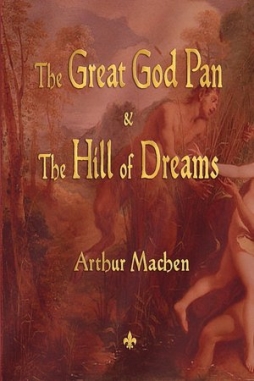 I’ll have more to say about this passage later, but I want to note here that it comes near the beginning of the story, and is unusual both in its lavish description of nature and its direct presentation of experience. Most of “The Great God Pan” takes the form of stories told by one character to another, recollections of deeds and investigations and facts that happen to have come into their possession. It’s been called a variant of the ‘club story’ by John Clute (a story that takes the form of a story being told, typically by a man to an audience of men), the horror of the tale serving to undermine the traditional assumption of a club as a safe space for the telling of a fiction. Personally, I think there are elements of the club story, but the overlapping narratives, and the way some of the characters withhold information from others, create a more dialogue-like structure — the tales, and texts, that make up the story are pieces of a puzzle that don’t become clear until the end.
I’ll have more to say about this passage later, but I want to note here that it comes near the beginning of the story, and is unusual both in its lavish description of nature and its direct presentation of experience. Most of “The Great God Pan” takes the form of stories told by one character to another, recollections of deeds and investigations and facts that happen to have come into their possession. It’s been called a variant of the ‘club story’ by John Clute (a story that takes the form of a story being told, typically by a man to an audience of men), the horror of the tale serving to undermine the traditional assumption of a club as a safe space for the telling of a fiction. Personally, I think there are elements of the club story, but the overlapping narratives, and the way some of the characters withhold information from others, create a more dialogue-like structure — the tales, and texts, that make up the story are pieces of a puzzle that don’t become clear until the end.
Machen uses this structure cleverly to create some powerful, and occasionally oddly contradictory, effects. Notably, for all that his characters tell the tale through their talk, many of the key points of the horror remain unspoken. What did Helen do with Rachel, her playmate in Wales? I’m not really sure, but Clarke remembers telling the friend who had outlined the story to him that “It is too incredible, too monstrous; such things can never be in this quiet world, where men and women live and die, and struggle, and conquer, or maybe fail, and fall down under sorrow, and grieve and suffer strange fortunes for many a year; but not this, Phillips, not such things as this.” How did Helen ruin Charles Herbert’s life? Says Herbert to Villiers: “… I listened to her as she spoke in her beautiful voice, spoke of things which even now I would not dare whisper in the blackest night, though I stood in the midst of a wilderness. You, Villiers, you may think you know life, and London, and what goes on day and night in this dreadful city; for all I can say you may have heard the talk of the vilest, but I tell you you can have no conception of what I know, not in your most fantastic, hideous dreams can you have imaged forth the faintest shadow of what I have heard — and seen. Yes, seen. I have seen the incredible, such horrors that even I myself sometimes stop in the middle of the street and ask whether it is possible for a man to behold such things and live.”
There are pieces missing from the jigsaw. We have to guess at the whole of the image. In the midst of sober, straightforward tale-telling are unexpected gaps.
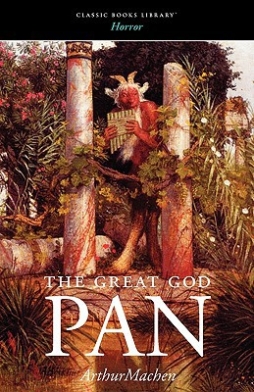 Given that we’re looking at the late Victorian age, and given that one of the men Helen destroyed was her husband, to whom she revealed terrible secrets on their wedding night, a common presumption is that what cannot be said in the story has to do with sexuality. The use of Pan, god of sexuality and fertility, as the emblem of the spiritual experience Mary undergoes strongly argues for that presumption. So from a certain point of view, the story is what happens when sex becomes a horror, when Pan instills panic. By not talking about sex, by not naming it directly, it becomes destructive. And in that sense the ending makes symbolic sense: dare to expose the horror, to talk about it openly, and the threat recedes.
Given that we’re looking at the late Victorian age, and given that one of the men Helen destroyed was her husband, to whom she revealed terrible secrets on their wedding night, a common presumption is that what cannot be said in the story has to do with sexuality. The use of Pan, god of sexuality and fertility, as the emblem of the spiritual experience Mary undergoes strongly argues for that presumption. So from a certain point of view, the story is what happens when sex becomes a horror, when Pan instills panic. By not talking about sex, by not naming it directly, it becomes destructive. And in that sense the ending makes symbolic sense: dare to expose the horror, to talk about it openly, and the threat recedes.
One must also consider the misogynistic aspects of the tale. The horror operates through a woman (even if the ultimate source of the horror is a male god). Clute, in The Encyclopedia of Science Fiction, has described the surgery that opens the way for Pan to enter the world as “a metamorphosis which remains one of the most dramatically horrible and misogynistic in fiction”; the casual way in with Raymond claims ownership of Mary — “I think her life is mine, to use as I see fit” — is certainly chilling. The absence of women’s voices, in a story shaped by men talking and writing to each other, is notable. And the comparison of several male suicides to the Ripper murders is almost shocking: “The police had been forced to confess themselves powerless to arrest or to explain the sordid murders of Whitechapel; but before the horrible suicides of Piccadilly and Mayfair they were dumbfounded, for not even the mere ferocity which did duty as an explanation of the crimes of the East End, could be of service in the West. …There was a horror in the air, and men looked at one another’s faces when they met, each wondering whether the other was to be the victim of the fifth nameless tragedy.”
I suspect in the last case at least Machen’s being consciously parodic, contrasting the reaction to the killing of poor women and that of rich men. I note that the chronology doesn’t quite work: the death of Helen is firmly established in the last chapter as July 25, 1888, while the first Whitechapel killing took place in the early morning of August 31. But the comparison does suggest a sexual undercurrent to the deaths, hinting at the things that cannot be spoken of in polite society.
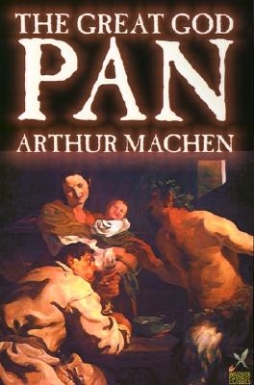 I wonder, in fact, if the story can’t be read as a whole in that light: as a story about the nature of repression, written at about the same time Freud was beginning to think of repression as a psychological concept. In that sense, the misogyny and implied horror of sex are aspects of a broader fear. Specifically, the fear of what is being repressed emerging, and emerging violently and destructively. One of the few times any of the characters — Austin — sees Helen in person, he says that her “features are exquisite, but the expression is strange; and all the time I was looking at her, and afterwards, when I was going home, I had a curious feeling that that very expression was in some way or other familiar to me. … What I felt was a kind of dim far-off memory, vague but persistent. The only sensation I can compare it to is that odd feeling one sometimes has in a dream, when fantastic cities and wondrous lands and phantom personages appear familiar and accustomed.” Dreams and familiarity: repression emerging through the unconscious. And so Austin declares that the suicides Helen inspires make London “a city of nightmares.”
I wonder, in fact, if the story can’t be read as a whole in that light: as a story about the nature of repression, written at about the same time Freud was beginning to think of repression as a psychological concept. In that sense, the misogyny and implied horror of sex are aspects of a broader fear. Specifically, the fear of what is being repressed emerging, and emerging violently and destructively. One of the few times any of the characters — Austin — sees Helen in person, he says that her “features are exquisite, but the expression is strange; and all the time I was looking at her, and afterwards, when I was going home, I had a curious feeling that that very expression was in some way or other familiar to me. … What I felt was a kind of dim far-off memory, vague but persistent. The only sensation I can compare it to is that odd feeling one sometimes has in a dream, when fantastic cities and wondrous lands and phantom personages appear familiar and accustomed.” Dreams and familiarity: repression emerging through the unconscious. And so Austin declares that the suicides Helen inspires make London “a city of nightmares.”
Raymond’s avant-garde science brings out a spiritual experience — a primal, pre-rational experience. So Mary’s reason is entirely annihilated; without knowing it, Raymond’s entire project is the overthrow of the rational and, ironically, the scientific. He is bringing out into the open the secret drive that the Victorian age could not speak of; he is also exposing the fact that there are things that cannot be spoken of, and that the conscious mind is only a part of the overall human being.
I wonder if it’s also significant that Machen set the first scene in Wales; that it is from Wales that Helen emerges. Of course, it echoes his own childhood experience, but it’s also a land that was conquered by the English, that had its identity repressed. The end of the book associates the emergence of Pan with the discovery of a Roman ruin, and a reference to ‘Nodens’ — who seems to have been worshiped specifically in Roman Wales. Nodens, due to his use by Machen, was later absorbed into Lovecraft’s mythos. It’s also interesting that Machen may have been inspired by the discovery of an inscription to Nodens found in a temple complex at Lydney Park, which was later excavated by a team which included J.R.R. Tolkien. So there is perhaps a sense in which English colonialism, the uneasy fear of the repressed other, becomes a contributing element to the book.
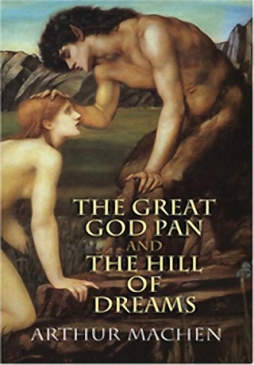 Certainly there is a sense in which Helen represents a threat to the orthodox. She’s constantly associated not merely with the dangerous, but the blasphemous. For Clarke, her existence is part of the proof of the existence of the devil. When he sees her picture, he thinks it is “the most vivid presentment of evil I have ever seen.” He later writes that he is “like a traveller that has peered over an abyss,” presumably both the abyss of which Nodens is lord and master, and the abyss of hell. A ruined man is described by Villiers as “a lost soul … it was a devil’s face that I looked upon.”
Certainly there is a sense in which Helen represents a threat to the orthodox. She’s constantly associated not merely with the dangerous, but the blasphemous. For Clarke, her existence is part of the proof of the existence of the devil. When he sees her picture, he thinks it is “the most vivid presentment of evil I have ever seen.” He later writes that he is “like a traveller that has peered over an abyss,” presumably both the abyss of which Nodens is lord and master, and the abyss of hell. A ruined man is described by Villiers as “a lost soul … it was a devil’s face that I looked upon.”
But one could view this insistence on ‘evil’ as the conscious mind recoiling before the repressed material it wishes to deny. Certainly in looking at the few actual descriptions Machen provides, one wonders at the fear they inspire in the characters. Meyrick, the artist, is inspired by Helen to draw a “frightful Walpurgis Night of evil, strange monstrous evil” — consisting mainly of fauns and satyrs. This is symbolically apt, though. This is a depiction not merely the fear of diabolism, but of paganism; so the mystery of the suicides, Austin thinks, is “as hopeless and perplexed as the labyrinth of Dædalus”. And, significantly, the name of Helen herself insists on the paganism of the classics.
All these things come together. The doctor who examines Helen’s corpse declares that “for one instant I saw a Form, shaped in dimness before me, which I will not further describe. But the symbol of this form may be seen in ancient sculptures, and in paintings which survived beneath the lava, too foul to be spoken of …” The reference is clearly to Pompeii, where sexually explicit material was discovered and locked away in a secret museum whose door was bricked over. Sex, paganism, the atavistic, the feminine, the irrational, the other: this is what Raymond’s science ultimately brought into consciousness.
If it was entirely science. Look again at Clarke’s reverie, and the moment of revelation that ends it. He seems to be describing an encounter with the divine (the reference to an “undiscovered country” perhaps points up the unEnglishness of the Welsh countryside, but is certainly a Shakespearean echo of the afterworld). Raymond himself describes how the idea of his experiment came to him in almost mystical terms:
After years of labour, after years of toiling and groping in the dark, after days and nights of disappointments and sometimes of despair, in which I used now and then to tremble and grow cold with the thought that perhaps there were others seeking for what I sought, at last, after so long, a pang of sudden joy thrilled my soul, and I knew the long journey was at an end. By what seemed then and still seems a chance, the suggestion of a moment’s idle thought followed up upon familiar lines and paths that I had tracked a hundred times already, the great truth burst upon me, and I saw, mapped out in lines of sight, a whole world, a sphere unknown; continents and islands, and great oceans in which no ship has sailed (to my belief) since a Man first lifted up his eyes and beheld the sun, and the stars of heaven, and the quiet earth beneath. You will think this all high-flown language, Clarke, but it is hard to be literal. And yet; I do not know whether what I am hinting at cannot be set forth in plain and lonely terms. For instance, this world of ours is pretty well girded now with the telegraph wires and cables; thought, with something less than the speed of thought, flashes from sunrise to sunset, from north to south, across the floods and the desert places. Suppose that an electrician of today were suddenly to perceive that he and his friends have merely been playing with pebbles and mistaking them for the foundations of the world; suppose that such a man saw uttermost space lie open before the current, and words of men flash forth to the sun and beyond the sun into the systems beyond, and the voice of articulate-speaking men echo in the waste void that bounds our thought. As analogies go, that is a pretty good analogy of what I have done; you can understand now a little of what I felt as I stood here one evening; it was a summer evening, and the valley looked much as it does now; I stood here, and saw before me the unutterable, the unthinkable gulf that yawns profound between two worlds, the world of matter and the world of spirit; I saw the great empty deep stretch dim before me, and in that instant a bridge of light leapt from the earth to the unknown shore, and the abyss was spanned.
Again, the abyss, the domain of Nodens. Has Raymond’s realisation been inspired by Nodens, who is also Pan, who is also Satan? That seems to be the implication. And why? To bring a child into this world, mothered by a young girl named Mary. Helen is a female antichrist. Or, from another perspective: she is the undoing of progress. Rather than proceeding from paganism to Christianity, as orthodox Victorian belief imagined the progress of history, she is a reversal of time, the revenge of the atavistic.
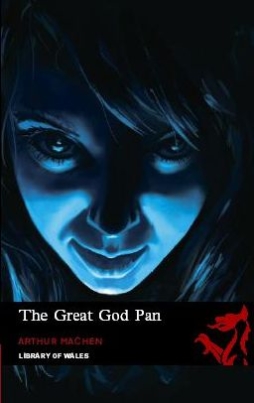 The way I look at “The Great God Pan,” it’s about repression, and the repression of a complex array of forces. It’s about the emergence of the archaic. And it’s about the horror and sense of dread the emergence of repressed material brings. The flashes of inspiration that dawn upon the conscious mind may be directed by the unconscious to bring about the articulation of what cannot be said by any other way.
The way I look at “The Great God Pan,” it’s about repression, and the repression of a complex array of forces. It’s about the emergence of the archaic. And it’s about the horror and sense of dread the emergence of repressed material brings. The flashes of inspiration that dawn upon the conscious mind may be directed by the unconscious to bring about the articulation of what cannot be said by any other way.
It seems to me that “The Great God Pan” has an interesting place in the history of horror literature. Itself seemingly inspired in part by Frankenstein — Raymond is much closer to the popular image of the mad scientist than Victor Frankenstein — it has had a tremendous influence on later writers. Lovecraft and Stephen King have both been vocal in their praise for the story. And it’s impossible for me to read the book without thinking of Dracula: an introductory sequence featuring a horrified Englishman in a non-English setting; then a variety of seemingly-unconnected events in London, the metropole at the heart of Empire; then the discovery that all those events are in fact inspired by one malign and supernatural intelligence, that the rational contemporary capital is threatened by the irrational and archaic; then an equivocal conclusion. The fear of sex, women, foreignness. The story told through a collation of texts and tales.
Ultimately, I think Machen’s story never quite gained the fame of Frankenstein or Dracula due to the lack of an evocative monster. Where both the other novels present a real and somehow charismatic threat, Machen’s Helen is more equivocal, more distant. More difficult to understand. That’s not necessarily a weakness, though. It may be a testament to Machen’s artfulness. He understood indirection and allusiveness. He knew what he was doing, when horror was to be externalised and when it was to be left to remain a reflection of our own internal abysses. “The Great God Pan” is a fascinating, troubling story, and, for all its influence, not like much else than I can think of. It’s not simple, and yet it’s effective, more so than can easily be explained.
Matthew David Surridge is the author of “The Word of Azrael,” from Black Gate 14. His ongoing web serial is The Fell Gard Codices. You can find him on facebook, or follow his Twitter account, Fell_Gard.
It seems that Bob Dylan is a fan of “The Great God Pan.”
https://x.com/bobdylan/status/1849178408443339018?s=58&t=1bK9LDNLvH4oVQlI1RmoVA
Before folks start running with the idea that Bob is a fan of horror fiction per se, consider this. GGP is the story in which we find “In every grain of wheat there lies hidden the soul of a star.” I wonder if Bob — who wrote “Every Grain of Sand” — was stopped dead in his tracks when he read that. (Machen also quotes this sentence in one of his autobiographical books.)
GGP seems to me a horror story all right, but the horror is wrapped in a greater sense of wonder. The scientist sacrilegiously experiments on a trusting virgin girl out of his pride and curiosity and horror follows. His was an act of great impiety. It didn’t reveal the ultimate dreadful horror that existence really is — as Lovecraft would have thought. His experiment undid the holy work of the divine that from chaos made beauty and intelligence, both of which are reft from Mary. So anyway I read the story.
Lovecraft is a nay-sayer but Machen was a yea-sayer, and so, it seems to me, is Dylan.